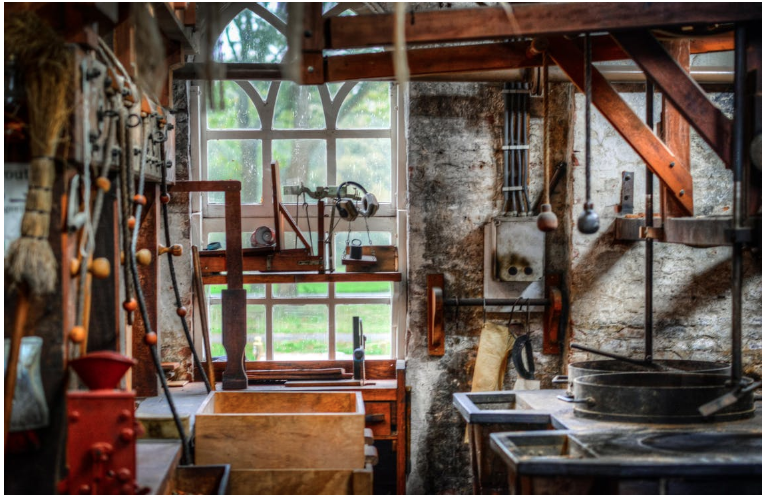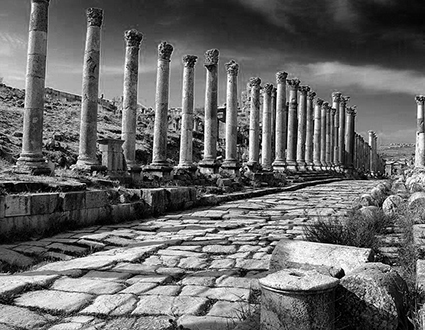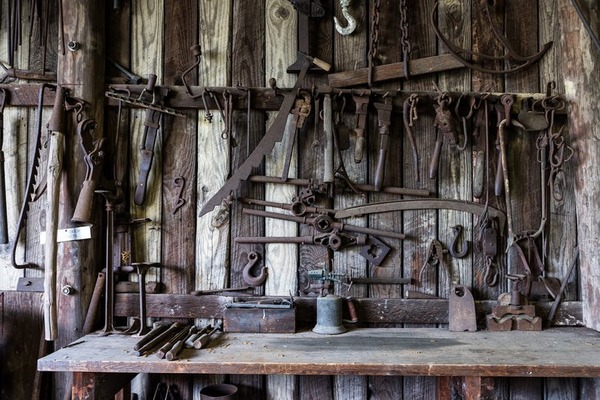Crafting Yourself: Why the Stoics Will Help You Become a More Productive and Creative Maker

“As is a tale, so is life: not how long it is, but how good it is, is what matters.” – Seneca
The Project
Suppose you are getting ready to start a really big project––a project that will require an immense amount of time and effort, a project that has so many parts and components that you are certain that you will lose your way and make mistakes. It is just that big. And yet the one thing you can be certain about is that the materials for this project are precious and you will not be able to re-start the project once you begin––you'll have to keep forging ahead even if you make mistakes. It will be the summative production of your crafting life, and nothing that you make will be more important, more visible or have a greater impact on the world than it.
For the Stoics––a group of philosophers and intellectuals who flourished in the early Roman Empire––a person's life was a gigantic project that he or she forged through their lifetime. Stoic philosophers considered every aspect of life and how it was lived to be part of a crafting of who a person was. And how any individual lived––their experiences, decisions, relationships, labors, self-stylistics, manner, education, employment, etc. etc. etc.––helped shape them, but it also represented that person's life itself. To be a Stoic was to imagine your life as a project that you were constantly working on––conscientiously or not––and that would be judged at its conclusion for its craftsmanship, its integrity, its beauty and its effect on the world.
Of course, there really are no “modern Stoics,” per se. While Stoicism still holds sway as an influential part of discussions among ethicists and certain philosophers, it has largely lost its cultural influence. Even so, I think that Stoic philosophers have a lot to teach us, and especially those of us who think of the world in terms of our ability to shape it with our hands and our instincts to create. Not unlike Robert Pirsig's efforts in Zen and the Art of Motorcycle Maintenance, I think there is room at the crafting table/workbench/cutting board for Stoic voices to remind us that just as we make the world in which we live, our lives are what we craft them to be.

The Materials
The chasm of knowledge and understanding that separates modern, 21st century people from the heyday of Stoic philosophy is nowhere more clear than in how we view the human body. Where ancient Romans would see the body as a balance of liquids, temperatures and states that would make no sense to us, our ideas about the body as a mechanism with parts and systems would make very little sense to them. Its important not to get caught up in arcane details, but there is one important idea here that can't be missed. For the Stoics, the human soul was a substantial and material part of the world that took its shape from what happened to the body. It was the divine spark that linked all intelligent and cognizant life in the world, and which made a human person unique: a creature of creativity, willfulness and the ability to learn.
This is important because this soul constituted the raw materials that Stoics believed their teachings would have their effect. In other words, Stoics didn't have a metaphorical concept of the “self” or an imagined concept of “soul” or “spirit.” They perceived it as a real physical thing in the body that had a shape and a physics and was the you-est you there was. (In the Harry Potter books, when Dementors are said to “kiss” their victims and take their soul, that is a very Stoic concept of the soul.) The philosopher Epictetus described the human being as “a little soul carrying around a corpse.”
The reason this matters is that, for Stoics, this soul constituted the materials that were being shaped by the craft of a person's life. For our purposes, we do not have to believe in a soul quite like this for Stoic ideas to work. But imagine if our lives, our experiences, our traumas and joys, our emotions and our physical disciplines––imagine if they all worked their imprint onto our souls. What shape would we wish our souls to be? How might we change our lives if we considered how our experiences and our responses to them could make us a better or worse version of ourselves? What if shaping who we were was a result of the powerful force of the self-imposition of our wills to our circumstances, just as the imposition of the chisel to the stone shapes and forms it?

The Pattern
The shaping that Stoics imagined was not random or guideless. There was a pattern that was available to all rational people: nature itself. It served for Stoic philosophers what a blueprint would serve for someone building a home. The Emperor and Stoic philosopher Marcus Aurelius––yes, the Marcus Aurelius from Gladiator––veritably sang, “O Universe, everything harmonizes with me which is harmonious to you!” The harmony Aurelius describes is the result of a universal pattern to all things, which helps inform how Stoics tried to live good lives. For a Stoic, there is an “ought-ness” to everything that is natural to the universe. The way we ought to be is so because that is what our nature dictates. At one level, this is extremely limiting and confining, because it meant that everything in the world had a place and a role, and beyond that place and role the thing was outside of the “natural” world. (To be fair and to be completely disclosing, this included lots of regressive issues about the roles of women, slaves, our sexual roles, etc. This part of Stoicism is not so helpful for us.)
But the “harmony” that Aurelius talks about speaks also to a profound intentionality about how human beings are supposed to relate to the world that can speak powerfully to us. And the most basic thing that human beings are supposed to be, according to Stoic philosophy, is happy. Happiness for most philosophers––not just Stoics––is not just a good mood. Happiness speaks to something more expansive and more encompassing than simply a positive emotion. It speaks to contentment, to a sense of completeness, a sense of a purposefulness that is being fulfilled. It has to do with the interface of what a person is supposed to be doing and the way the world has a venue and an opportunity to allow that to happen. If a wrench had a soul, a Stoic philosopher might reason, it would be happy when it was tightening and loosening bolts, when it was at its wrench-i-est.
For a Stoic, this harmoniousness is what happens when a person is truly free and unencumbered––freedom being the intended and natural state for the human person. But I can't hope to describe how gigantic this freedom is. For a true Stoic, this true freedom is synonymous with the self-empowerment that comes from acknowledging what is in our control and also what is beyond us. The Roman Stoic Seneca wrote:
For what prevents us from saying that the happy life is to have a mind that is free, lofty, fearless and steadfast – a mind that is placed beyond the reach of fear, beyond the reach of desire, that counts virtue the only good, baseness the only evil, and all else but a worthless mass of things… A man thus grounded must, whether he wills or not, necessarily be attended by constant cheerfulness and a joy that is deep and issues from deep within, since he finds delight in his own resources, and desires no joys greater than his inner joys.
In other words, someone who is truly happy is someone whose contentment is always rooted in self-sufficiency and a boundless ability to find contentment in things that only he or she can control. It means a life that is not filled with ambition and greed. And it means a life that is mostly concerned with being content doing the work that one was born to do. (You can see how this is truly a maker's philosophy!) Seneca continues to make his point:
But if you suppose that only to be your own which is your own, and what belongs to others such as it really is, then no one will ever compel you or restrain you. Further, you will find fault with no one or accuse no one. You will do nothing against your will. No one will hurt you, you will have no enemies, and you not be harmed.
This may seem like a tall order, and its possible that this is simply beyond most of us to live into reality. But I still think there's something here for makers and craftspeople. If I think of those people I know who prize their integrity and the way that they interface with the world, they are usually makers. Makers are people who meet the world as it is and always seem content to find their place within it. They are more satisfied exercising their creativity and craft than they are simply possessing or owning things. They see dignity in work, but also in rest and solitude. They are people who, I think, pursue a kind of freedom that resonates with Seneca and Aurelius. And their happiness feels akin to what Epictetus means when he describes being unsatisfied consuming things when you could instead be exercising your nature.

The Tools
The tools that go into living a life patterned on the freedom and harmony imagined by the Stoics finally gets into some of those dimensions of life I think will most resonate with people who think in terms of craft. The Stoics were really groundbreaking in thinking about life pragmatically and thinking carefully about the habits and manners that made for a contended life. And these tools are perhaps the most immediately useful for people to think about in 2018. You could find many more than the few listed here, but these few convey some important threads in Stoic thinking about how to become truly free and how to live a life that is contentedly happy.
Self-Critique
Being a copious and deliberate self-critic goes against many of the self-esteem-focused Saturday morning cartoons that certainly shaped my early years, but an honest and even brutal inventory of who you really are can be a huge breakthrough in your own life. It can highlight some things that you can fix to make yourself a truly better person, and just as importantly it can move you to become comfortable about aspects of who you are that you weren't before. I think the key here is to get a sense of distance from the critique. It is easier to hear something negative about yourself if you acknowledge that everyone is flawed, that flaws are changeable, and that perfection is unattainable. Its notable that when the Stoics themselves get into this idea, there's usually a smirk on their face about it. Epictetus writes, “If anyone tells you that a certain person speaks ill of you, do not make excuses about what is said of you but answer, 'He must not have known of my other faults, or else he would surely not have mentioned only these.'” I certainly wish I could muster than kind of self-deprecating response to cope with someone talking about me behind my back. But I think what Epictetus means is that if you are an honest and serious self-critic, no one in the world can hold anything over you. And that is a kind of personal empowerment I think most of us could really use.
Prize your Time
Aside from being the one bit of Latin most people can quote, “Carpe diem!” is a quintessentially Stoic idea. But there is a morbidity to the phrase that, I think, really can be a tool for those people who wake up most mornings waiting to get their hands dirty. Because there's always more you want to do and––here's the morbid part––your life is always running out. The Stoics would remind all of us that nothing in the universe is more valuable than your time, and that you should be more protective of it than you are about anything else. When you see time this way, the Stoics would say that you also realize something crucial about how you should carry yourself through your life: walk around like you have things to do. Seneca writes:
Putting things off is the biggest waste of life: it snatches away each day as it comes, and denies us the present by promising the future. The greatest obstacle to living is expectancy, which hangs upon tomorrow, and loses today. You are arranging what lies in Fortune's control, and abandoning what lies in yours. What are you looking at? To what goal are you straining? The whole future lies in uncertainty: live immediately.
“Live immediately.” Those words are so true they give me chills.
Pain, Difficulty and Defeat are Teachers
We live in a world of real traumas, violence on unspeakable scales and suffering that ruins lives. So this Stoic tool is a dicey one to raise, and I don't think it is a tool that can be used without a careful awareness of one's psychological and bodily well-being. But, of course, we have all suffered and struggled through life, and I think the Stoic insight here is to basically say, “don't waste this!” And for those of us who, perhaps, have suffered more than others, I think the Stoic insight would be, “look around you! you know more of yourself than others do!” This of course is not to prize pain or to pursue suffering like a kind of sadist. Real suffering is always an education; I think that Stoic philosophers might simply remind us that there's nothing wrong with taking notes as long as you have to listen to the lecture.
Friendship
Epictetus writes, “The key is to keep company only with people who uplift you, whose presence calls forth your best.” It has never ceased to amaze me how much attention philosophers and other ancient people paid to friendship. It is a gigantic part of how they saw the world and their experience in it. And I think Epictetus gets at exactly why our friendships are so important and so uniquely valuable. Because our friends––if they are true friends––should encourage us and make us feel good, but they should also “call forth [our] best.” In an age where we have created categories of friendship that are defined by how unimportant they are to us (think of how we use the term “a Facebook friend”), I think the Stoics would remind us that we have to cultivate relationships with people who make us more truly ourselves, and even our best selves. A friend is not simply an intimate connection or a friendly person to recognize in social settings. A real friend should be challenging and maybe even a little bit intimidating––someone you feel like you can stand back from and in that perspective shift see a person with habits and characteristics that you would like to better emulate. Seneca is even more straightforward: “Associate with people who are likely to improve you,” he writes. Our friends can be part of how we become the kind of people we are supposed to be––and like a long-used tool that fits perfectly in your hand or a familiar forest trail whose bumps and ridges are known deeply in your bones, we should see our friends as an extension of ourselves and our experience. They should be a part of how we see the world.
Finishing the Project
I think for most people who have worked on a big, ornate project, there is a sense that you could go on forever tweaking and nitpicking here and there. But at some point, you have to step away, put down your tools, and look on to admire the work as a whole. Perhaps no one will comprehend the work that went into every part more than you, but its beauty and form and utility will be evident to anyone who sees it. Eventually you have to step away, because the project is finished.
As far as metaphors for death are concerned, that's not a bad one. Even an expert cabinet maker eventually puts down her tools and steps away. And so must we. But if the Stoics have something to teach us, I think conceiving of the end may be one of the more comforting dimensions of their perspective. Because there is a real sense of completion and accomplishment when you conclude a project. There really isn't a feeling to match it. And perhaps considering our lives as a project is also a way to consider our experience of death as something we should never entirely forget. To do so is to make living all the more important. Seneca muses that,
“True happiness is to understand our duties… to enjoy the present, without anxious dependence on the future; not to amuse ourselves with either hopes or fears, but to rest satisfied with what we have, which is abundantly sufficient.”
If we look at ourselves as something that is in process and ready to be completed, we are more apt to be content with where we are, to suck every morsel off of the bone and to enjoy every passing moment to its fullest extent.
When we step away from this grand project, the Stoics would also remind us that it will be on view to other people as an emblem of your life and who you were. Even if we are careful craftspeople, we will leave something that is flawed and imperfect, but in our deliberateness and our care it will also be inspiring to see. I think we've all known people whose lives shine through their deaths and stand as an extraordinary accomplishment that has touched how we live our lives. And we may also know people who didn't do much with their raw materials throughout their entire lives, and who leave behind something that is unworked and stubborn––a failed project, as it were.
We should be attentive to both the beautiful projects and the incomplete ones that we come across. There is much to learn from both. And having taken a note and learned from our predecessors, it is time to get to work on our own lives and carve into ourselves the perfectly unique relief that results when our experience of the world meets our skill to craft.
Where to Get Started
The Stoic philosophers flourished beginning in the 3rd century BCE and had their heyday during the late Republic and early Roman Empire (1st–2nd centuries CE). For that reason, we have a sizeable chunk of material from Stoic philosophers whose teaching was especially valued by elite Roman citizens, though it also flourished among less socially prominent groups. The writing of Stoic thinkers tends to be very approachable even from a modern standpoint, and it is worth noting that the ideas of some of these thinkers have even been styled as self-help literature among some more modern interpreters. The best Stoic texts to get into if you are new to it are those figures I've been citing throughout. So you might start with:
- Epictetus, Discourses and Enchiridion.
- Seneca, Letters to Lucilius
- Seneca, On the Shortness of Life
- Marcus Aurelius, Meditations (though a better translation of this title would be something like, Notes to Self.)
Beyond these texts, you could certainly dive deep and find fragmentary texts from earlier Stoics, the influence of Stoic thinkers of Jewish and Christian intellectuals, and even modern syntheses of Stoic thought. So if you'd like to take a few steps further, maybe start with the wonderful “very short” introduction to Stoicism by Brad Inwood.









